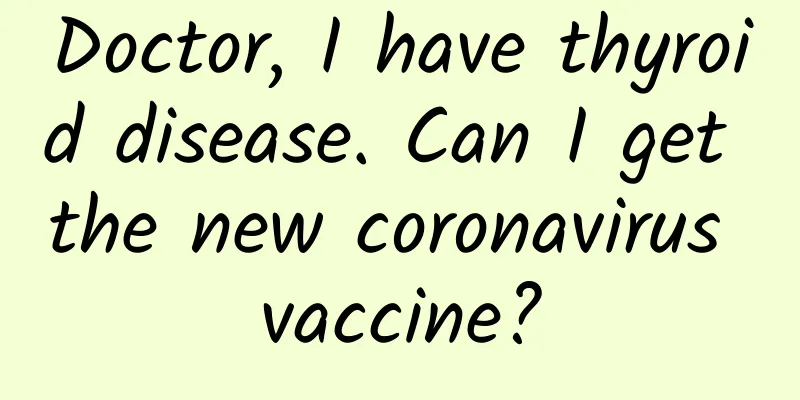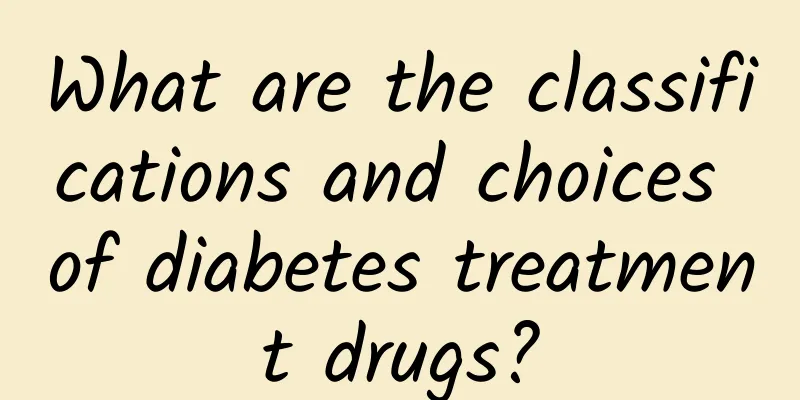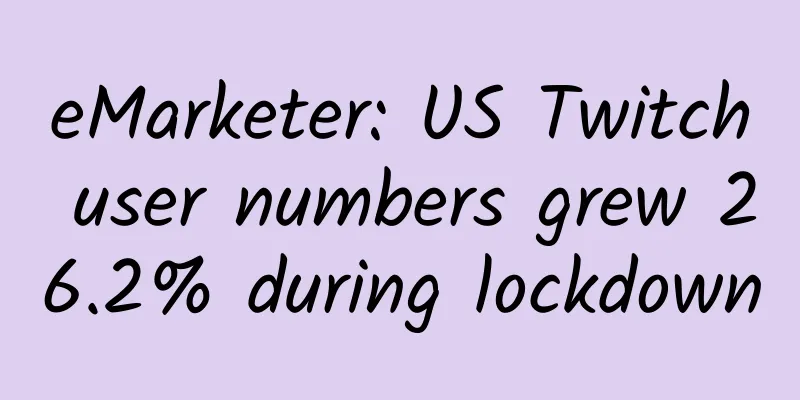Doctor, I have thyroid disease. Can I get the new coronavirus vaccine?

|
Author: Yu Fei, Chief Physician and Professor of Shanghai Tenth People's Hospital Reviewer: Qu Shen, Chief Physician and Professor of Shanghai Tenth People's Hospital "Doctor, I want to get the COVID-19 vaccine, but my hyperthyroidism has not been well controlled recently, and I often feel anxious and my hands tremble. Can I still get the vaccine?" "Doctor, I have been taking levothyroxine sodium tablets (Euthyrox), can I get the new coronavirus vaccine?" "Doctor, it's been a few years since I had surgery for thyroid cancer. Can I get the vaccine?" Copyright images are not authorized for reproduction Can people with thyroid disease get vaccinated? Regarding this issue, based on the "Technical Guidelines for New Coronavirus Vaccine Vaccination (First Edition)" (hereinafter referred to as the "Guidelines") issued by the Disease Prevention and Control Bureau of the National Health Commission of the People's Republic of China in March 2021 and the "Guidelines for New Coronavirus Vaccine Immunization for Patients with Thyroid Disease (First Edition)" (hereinafter referred to as the "Guidelines") issued by the Beijing Center for Disease Control and Prevention on January 5, 2021, and combined with common problems of clinical patients, the following is a summary of the precautions for patients with thyroid disease to receive the new coronavirus vaccine for your reference. Can I be vaccinated if I have obvious symptoms, feel unwell, or have abnormal thyroid function? Obvious symptoms, physical discomfort, and abnormal thyroid function are all because the thyroid disease has not been controlled. Although the "Guidelines" do not list thyroid disease as a contraindication to COVID-19 vaccination, patients with fever, acute diseases, acute attacks of chronic diseases, and uncontrolled severe chronic diseases are listed as contraindications to vaccination. Therefore, for patients with the following uncontrolled thyroid diseases, it is recommended to postpone COVID-19 vaccination. (1) For patients with uncontrolled hyperthyroidism (hereinafter referred to as "hyperthyroidism"), the nutritional status will be relatively poor, and coupled with abnormal immune function, the risk of adverse reactions after vaccination may increase. In addition, some symptoms of hyperthyroidism patients, such as palpitations and diarrhea, are similar to adverse reactions after vaccination, which is not conducive to distinguishing whether it is the symptom itself or the adverse reaction of the vaccine. Therefore, it is recommended that patients with hyperthyroidism postpone vaccination when their condition is not under control. (2) Patients with hypothyroidism (hereinafter referred to as "hypothyroidism") are also advised to postpone vaccination if their thyroid function is abnormal, that is, laboratory tests show elevated serum thyroid stimulating hormone (TSH) and decreased free thyroxine (FT4). (3) For patients with exophthalmos due to hyperthyroidism, vaccination should be postponed when the disease is in the active stage. (4) If patients with subacute thyroiditis have obvious symptoms such as fever, pain in the front of the neck, and general discomfort, they are in the acute stage of the disease and it is recommended to postpone vaccination. I am currently taking levothyroxine sodium tablets (Euthyrox), methimazole tablets (Thimazole, Methimazole)... Can I get the new coronavirus vaccine? Some patients with thyroid diseases need long-term medication. Can they be vaccinated during medication? The Guidelines clearly state that taking levothyroxine (Euthyrox) or antithyroid drugs methimazole (Thiazol, Methimazole) and propylthiouracil is not a contraindication to vaccination. However, based on clinical practice, there are four types of situations in which patients are also advised to postpone vaccination. (1) For patients diagnosed with hyperthyroidism, it is recommended to postpone vaccination when using antithyroid drugs for the first time or when they have just switched to another antithyroid drug. This is because some patients may experience adverse drug reactions, such as allergies and urticaria, in the early stages of antithyroid drug treatment. Vaccination at this time is difficult to distinguish from adverse reactions to the vaccine. It is recommended to vaccinate after using the same antithyroid drug for 3 months and when the hyperthyroidism is under control. There are two other methods for treating hyperthyroidism, iodine-131 treatment or surgical treatment. Since both methods may cause changes in thyroid function, vaccination should also be postponed. (2) Patients diagnosed with hypothyroidism should postpone vaccination when their condition has not yet been stabilized after starting treatment with levothyroxine (Euthyrox). When the condition of hypothyroidism is under control and the patient is taking a stable dose of levothyroxine, vaccination can be performed. (3) Patients with exophthalmos caused by hyperthyroidism who are treated with glucocorticoids should postpone vaccination during the treatment period, because high doses of glucocorticoids suppress immune responses and may reduce the effectiveness of the vaccine. (4) For patients with exophthalmos caused by hyperthyroidism who are treated with rituximab, it is recommended that vaccination be postponed within 6 months after treatment. This is because rituximab treatment can inhibit humoral immune response and may reduce the effectiveness of the vaccine. In addition, vaccination should not be given within 4 weeks before re-administration of the drug. Can people with Hashimoto's thyroiditis, thyroid nodules, and thyroid cancer be vaccinated? Neither the "Guidelines" nor the "Guidelines" include these three groups of people in the group that is contraindicated for COVID-19 vaccination. Based on the patient's clinical manifestations, the following three suggestions are made. (1) Patients with Hashimoto's thyroiditis: Those with normal thyroid function and positive thyroid autoantibodies can be vaccinated. (2) Patients with benign thyroid nodules: If the thyroid function is normal and there are no discomfort symptoms, vaccination can be performed. If the thyroid function is abnormal, the cause needs to be identified and vaccination should be postponed until the cause is identified. (3) Thyroid cancer patients: For patients with differentiated thyroid cancer (including papillary carcinoma, follicular carcinoma, etc.) who have undergone surgery, it is recommended that vaccination be postponed for a short period of time after surgery; after comprehensive evaluation, patients who are considered to have a medium-to-high risk of recurrence, or patients who plan to undergo iodine-131 treatment in the short term, are also recommended to postpone vaccination. Generally, vaccination can be considered after the condition is stable and thyroid function is basically normal. |
<<: ComScore: Apple's U.S. smartphone market share reached 41.8% in Q4 2013
>>: Globalwebindex: Global mobile internet usage reaches 65%
Recommend
How can a postpartum mother lose weight if she doesn't have time to exercise?
After a woman is pregnant for ten months and then...
"Sweet" without knowing it? Be careful of this disease! To prevent it, do these 5 things
According to the latest chronic disease The resul...
What is the reason for vaginal bleeding sometimes?
In daily life, many women often find that their v...
Why is it so difficult to get pregnant?
People usually think that the best time for women...
What should you pay attention to when you have vaginal bleeding?
Many women get pregnant due to momentary impulse,...
Delayed menstruation and chest pain
Women's menstrual periods are regular in each...
Popular Science on Organ Examination: Was Daiyu infected with tuberculosis? (Part 1)
Baoyu uses the "Mycobacterium tuberculosis c...
Can pregnant women drink chestnut chicken soup?
During pregnancy, pregnant women tend to choose f...
What should I pay attention to after injecting hyaluronic acid?
Everyone loves beauty, whether it is a boy or a g...
What Chinese medicine can I use to get rid of eye bags?
Eye bags appear due to the accumulation of melani...
The standard of female body measurements
What are the proportions of a woman's height,...
Can I eat bitter melon during menstruation?
Bitter melon has always been a food that everyone...
Is there a regularity in ovulation?
Mature women ovulate every month. We know that wo...
What are the symptoms before menstruation?
Generally speaking, women will experience a serie...
Coronary atherosclerotic heart disease: a "romantic entanglement" with the heart
In the human heart, there is a group of small cre...









